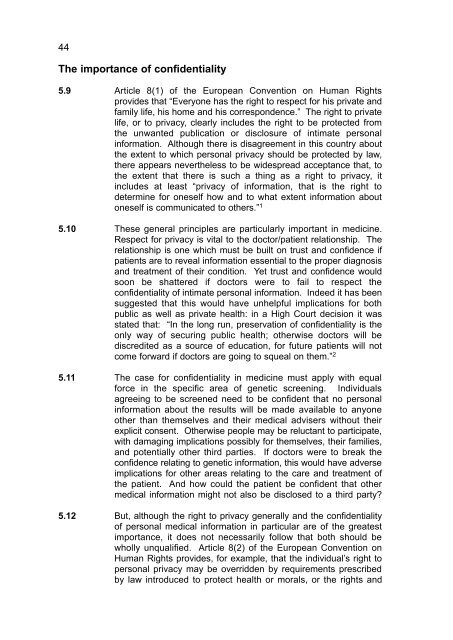Genetic screening: ethical issues - Nuffield Council on Bioethics
Genetic screening: ethical issues - Nuffield Council on Bioethics
Genetic screening: ethical issues - Nuffield Council on Bioethics
You also want an ePaper? Increase the reach of your titles
YUMPU automatically turns print PDFs into web optimized ePapers that Google loves.
44<br />
The importance of c<strong>on</strong>fidentiality<br />
5.9 Article 8(1) of the European C<strong>on</strong>venti<strong>on</strong> <strong>on</strong> Human Rights<br />
provides that “Every<strong>on</strong>e has the right to respect for his private and<br />
family life, his home and his corresp<strong>on</strong>dence.” The right to private<br />
life, or to privacy, clearly includes the right to be protected from<br />
the unwanted publicati<strong>on</strong> or disclosure of intimate pers<strong>on</strong>al<br />
informati<strong>on</strong>. Although there is disagreement in this country about<br />
the extent to which pers<strong>on</strong>al privacy should be protected by law,<br />
there appears nevertheless to be widespread acceptance that, to<br />
the extent that there is such a thing as a right to privacy, it<br />
includes at least “privacy of informati<strong>on</strong>, that is the right to<br />
determine for <strong>on</strong>eself how and to what extent informati<strong>on</strong> about<br />
<strong>on</strong>eself is communicated to others.” 1<br />
5.10 These general principles are particularly important in medicine.<br />
Respect for privacy is vital to the doctor/patient relati<strong>on</strong>ship. The<br />
relati<strong>on</strong>ship is <strong>on</strong>e which must be built <strong>on</strong> trust and c<strong>on</strong>fidence if<br />
patients are to reveal informati<strong>on</strong> essential to the proper diagnosis<br />
and treatment of their c<strong>on</strong>diti<strong>on</strong>. Yet trust and c<strong>on</strong>fidence would<br />
so<strong>on</strong> be shattered if doctors were to fail to respect the<br />
c<strong>on</strong>fidentiality of intimate pers<strong>on</strong>al informati<strong>on</strong>. Indeed it has been<br />
suggested that this would have unhelpful implicati<strong>on</strong>s for both<br />
public as well as private health: in a High Court decisi<strong>on</strong> it was<br />
stated that: “In the l<strong>on</strong>g run, preservati<strong>on</strong> of c<strong>on</strong>fidentiality is the<br />
<strong>on</strong>ly way of securing public health; otherwise doctors will be<br />
discredited as a source of educati<strong>on</strong>, for future patients will not<br />
come forward if doctors are going to squeal <strong>on</strong> them.” 2<br />
5.11 The case for c<strong>on</strong>fidentiality in medicine must apply with equal<br />
force in the specific area of genetic <str<strong>on</strong>g>screening</str<strong>on</strong>g>. Individuals<br />
agreeing to be screened need to be c<strong>on</strong>fident that no pers<strong>on</strong>al<br />
informati<strong>on</strong> about the results will be made available to any<strong>on</strong>e<br />
other than themselves and their medical advisers without their<br />
explicit c<strong>on</strong>sent. Otherwise people may be reluctant to participate,<br />
with damaging implicati<strong>on</strong>s possibly for themselves, their families,<br />
and potentially other third parties. If doctors were to break the<br />
c<strong>on</strong>fidence relating to genetic informati<strong>on</strong>, this would have adverse<br />
implicati<strong>on</strong>s for other areas relating to the care and treatment of<br />
the patient. And how could the patient be c<strong>on</strong>fident that other<br />
medical informati<strong>on</strong> might not also be disclosed to a third party?<br />
5.12 But, although the right to privacy generally and the c<strong>on</strong>fidentiality<br />
of pers<strong>on</strong>al medical informati<strong>on</strong> in particular are of the greatest<br />
importance, it does not necessarily follow that both should be<br />
wholly unqualified. Article 8(2) of the European C<strong>on</strong>venti<strong>on</strong> <strong>on</strong><br />
Human Rights provides, for example, that the individual’s right to<br />
pers<strong>on</strong>al privacy may be overridden by requirements prescribed<br />
by law introduced to protect health or morals, or the rights and
















